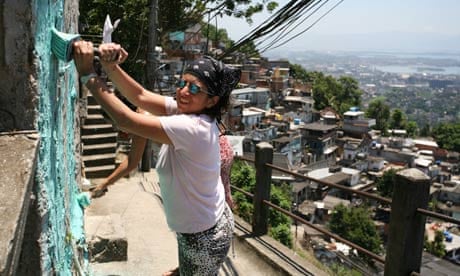In preparation for the 2014 World Cup and South America's first Olympic Games in 2016, Rio de Janeiro has attracted large investments – not only in the games themselves but, perhaps more importantly, in overcoming the massive divides in living standards in the city.
Following a series of largely unsuccessful attempts spread over decades, it would seem the various projects driven by the government-led growth acceleration program, as well as police pacification initiatives in which police patrol neighbourhoods they previously avoided to bring down crime rates, may finally be achieving the desired effects. Great news for the city's residents, who have longed for such a transformation.
But there is another side to this story. Rio de Janeiro's previously no-go neighbourhoods have now evolved into real-estate hotspots, where land beneath favela homes has become a goldmine.

According to the Getúlio Vargas Foundation, rents in the favelas have increased 6.8% more than rent in the wealthy areas over the past two years. Other news sources point to rocketing prices in these informal communities. In the Complexo Alemão, now deemed safer and with greater mobility, rents have tripled and leasehold charges are allegedly the same as in the exclusive shopping areas of the city. One unit in the Vidigal favela – a slum with a spectacular view of the ocean – was reportedly on sale for R$700,000 (£191,000).
The largest favela in Brazil, Rocinha, was recently announced to be a recipient of a R$1.6bn (£437m) infrastructure reform. One domestic cleaner claimed her family was one of 300 households on a broker's waiting list for a property in the area.
With a lack of governance from the start, leaving such markets to their own devices was always going to be problematic. Many investors are now planning to develop multi-story units on narrow tracts of land, with little attention to building or planning regulations.
With the majority earning modestly, most residents welcome the reforms. But with no signs of rents coming down, there is little option but to cram into smaller spaces or look for alternative solutions – of which there are few.

Eviction proceedings
At one extreme, there is the classic periphery relocation strategy favoured by local authorities as a means of freeing up land for more profitable purposes. However, as often witnessed in the short history of this programme, most families would rather stay put than move to a dormitory town where infrastructure and local public services are pitiful.
The recent decision by mayor Eduardo Paes to halt eviction proceedings against the Vila Autódromo community after nearly three years of intense campaigning demonstrates that favela residents refuse to be moved without a fight.
Yet such cases also demonstrate the various conflicts of interest and the fragile landscape that dominates the future of favelas in Rio and the rest of Brazil. The very erratic nature of local governance means fears remain that the funding tap may be turned off at any minute and that the pacification police forces could disappear after the Olympics.
Creating infrastructure and improving housing is a start, but preparations for the 2014 World Cup and 2016 Olympics must also integrate the diverse range of community organisations battling for change. Land and building regulations should be made less obscure and policy must be implemented to stem the effects of unsustainable real estate inflation, all the while addressing broader questions over long-term security, health and education. Let the peaceful protests continue.
Ruban Selvanayagam is partner and director at the Fez Tá Pronto Construction System
This article was amended on 21 August. It previously claimed the 2016 Olympics will be the first to be hosted in Latin America. This was incorrect.
This content is brought to you by Guardian Professional. Join the housing network for more news, analysis and comment direct to you

Comments (…)
Sign in or create your Guardian account to join the discussion